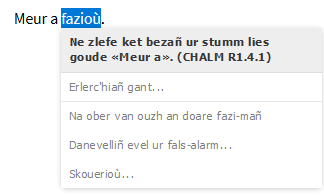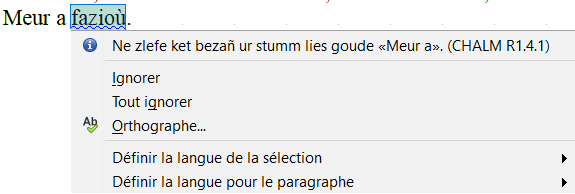Hello,
@Dominique_PELLE
I have heard more than once that the first sentence that appear when we open the LT web interfac isn’t correct because a preposition is missing in it.
So, the sentence is:
“Lakait amañ ho testenn vrezhonek da vezañ gwiriet. Pe implijit an frazenn-mañ gant meur a fazioù yezhadurel”, and it should be:
“Lakait amañ ho testenn vrezhonek da vezañ gwiriet. Pe implijit an frazenn-mañ gant meur a fazioù yezhadurel enni”.
All the best 
Kenô
Thanks for reporting those. I addressed both of them in:
and:
Dominique
Hello,
@Dominique_PELLE,
Recently the correction rule “meur a” no longer offers correction. But he’s just proposing a “replace with” on the web interface and in LO (LibreOffice) it is not proposing any suggestions anymore.
As you can see on the web interface:

And here in LO interface:

Do you have any idea why?
Kenô
Hi. This rule has never proposed a correction.
So it’s not a recent regression at least.
We could consider adding corrections there, but to be able to do
that we need to add a synthesizer to the Breton version of LT
(so we can suggest the singular form of a plural word, among other
things).
Some languages have such a synthesizer. I did it for French a long
time ago ago for example. I don’t recall how this is done but I can
investigate it when I find time.
Sorry, I took a long time to respond, but I’ve finally update the Breton spelling checker to An Drouizig 0.15 in:
Hello,
@Dominique_PELLE
I was thinking about it, maybe it could be put the link of this discussion in the Breton interface of LT?
Saying that a discussion has been opened about Breton and LanguageTool, what do you think?
The text could be: “digoret ez eus bet ur gaozedenn er forom, tro-dro d’ar brezhoneg ha LanguageTool, diwallit eta e saozneg e vez dalc’het. Setu al liamm evit mont e-barzh. Digorit ur gaozeadenn nevez er forom mod-all. Ma fellfe deoc’h kaout respontoù d’ho koulennoù ez eo aliet skrivañ e saozneg.”.
(A discussion has been opened in the forum, about Breton and LanguageTool, caution this discussion is in English. Here is the link to go in it. You can also open a new discussion into the forom. If you want to have answers to your questions please write in English preferably.)
Hi,
@Dominique_PELLE
There is a little mistake on this page: Braslenn reolennoù LanguageTool: 682 a genglot gant Breton
Ar fazioù-mañ a zo un darn eus ar re a “chall” LanguageTool diguzhat*. → “Ar fazioù da-heul a zo un darn eus ar re a “c’hall” diguzhat LanguageTool.”
A galon
Right. Thanks. I think it should be fine now. Can you check in transifex below?
Hello,
You will find a list of all the formulation (that I could find) with the conjunction “ma”, below.
Perhaps it will help you @Dominique_PELLE for a better rule for the mutations after this conjunction.
All the “ma” marked with * could be or a possessive and then make some different mutations as you know.
This list is now available on: ma - Wikeriadur.
-
- ma
-
-
zoken ma*
Kenô
-
zoken ma*
Hello folks, how are you,
There is a new version of Hunspell-br: An Drouizig Breton Spellchecker » Extensions.
Best
Pêr
Hello folks,
I’ve discovered that LT wasn’t able to correct:
En em gavet emaon a-raok ac’hanout → En em gavet emaon araozout.
I’ve tried to create a correcting rule for it, but I’m not sure of me.
Is this rule correct?
<!-- Breton rule, 2023-08-26 -->
<rule id="ARAOK_ACHANOUT_ARAOZOUT" name="a-raok ac'hanout > araozout">
<pattern>
<token>a-raok</token>
<token>ac’hanout</token>
</pattern>
<message></message>
<url>https://fr.wiktionary.org/wiki/a-raok</url>
<short>An araogenn \1 a vez displeget hep araogenn skoazell</short>
<example correction=''>En em gavet emaon <marker>a-raok ac'hanout</marker>.</example>
<example>En em gavet emaon araozout.</example>
<example>En em gavet emaon ez raok.</example>
<example>En em gavet emaon en da raok.</example>
</rule>
I did not notice it myself, because I don’t use LT in libreoffice much. I mostly use the command line interface.
